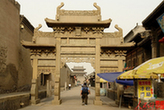a. Brief Introduction
A major landmark in the development of water management and technology in ancient China and one of the birthplaces of the Taoist religion.
Located in Sichuan Province, southwest China, this site consists of Mt. Qingcheng, the Dujiangyan Irrigation System, the Dragon Stream (Longxi) and the Iris Port (Hongkou). It was put under state-class protection in 1982.
The Dujiangyan Irrigation System was first built in 256 BC (during the Warring States Period) by magistrate Li Bing. It comprises three major projects―a water-dividing dam, flood-convergence route and water-divergence port. One of the earliest irrigation systems of China and still in use today, it serves to divert waters from the Minjiang River to the West Sichuan Plain. There are many cultural relics in the neighborhood, including the Temple of the Two Kings (Erwangmiao), the Temple of the Hidden Dragon (Fulongguan), the Bridge of Peaceful Waves (Anlanqiao) and the Li Mounds (Lidui).
Mt. Qingcheng was the birthplace of Taoism in China. With over 20 temples and religious sites for Taoism, it exudes a strong flavor of Taoist culture and the buildings demonstrate the Sichuan style of architecture.
b. Cultural Heritage
Large stone inscriptions by Huang Yunhu of the Qing Dynasty are prominent on the mountain, reading The fifth most famous mountain under Heaven and Top of Mt. Qingcheng. A 2.9-m-high and 4.5-ton statue of Li Bing, made 1,800 years ago, the first altorilievo stone sculpture in Chinese history, is now on display in a hall on the mountain after its excavation from a riverbed in 1974. Inscriptions recording water management methods, maps of Dujiangyan made in the Qing Dynasty and testimonials to Li Bing and his son are also on display, side by side with precious art works by several famous modern painters such as Xu Beihong, Zhang Daqian and Guan Shanyue.
c. Taoist Culture
Mt. Qingcheng is one of the birthplaces of Taoism. In the Eastern Han Dynasty (25-220 AD), the founder of Taoism, Tianshi (Celestial Master) Zhang Daoling once set up his pulpit here to give lectures. During the Tang Dynasty, advocates of the newly introduced Buddhism vied with the Taoists for this base, until Emperor Xuanzong allocated the mountain to the latter.
As an indigenous religion of China, the Taoist religion was initiated in the Eastern Han Dynasty by Zhang Daoling and developed ever since. It is part of Taoism in the larger sense, which is deeply inspired by the theory of Laotsu in the Spring and Autumn Period (770-476 BC) and features the harmony of human and nature, the virtue of leisure and tranquility, and a positive attitude toward the occult and the metaphysical. The Taoist religion, which is concerned with the ritual worship of the Tao, has a profound influence upon Chinese life.
Mt. Qingcheng is a representative site of Taoist culture. Major religious sites here include the Natural Picture (a building complex immersed in Nature), the Celestial Master's Cave (Tianshidong), the Hall of the Ancestral Masters (Zushidian), Cave Facing the Sun (Chaoyangdong) and the Palace of Celestial Freshness (Shangqinggong).
All structures are shaded by dense woods and embraced by nature. The Celestial Master's Cave, perched on a cliff with only a small path leading to its entrance, houses statues of Fuxi, Shennong and Xuanyuan (three legendary primeval kings of the Han people) on its main altar.
The Natural Picture is a building complex made of wood. Lying in the arms of high mountains and steep cliffs, it presents a lush and primitive view of forests and pure sky. The neighboring Crane-dwelling Village adds even more colors to the picture when the white cranes cruise gracefully among the mountain peaks.
Editor: Feng Hui





Why not rent a boyfriend, or girlfriend to please parents during the Spring Festival?